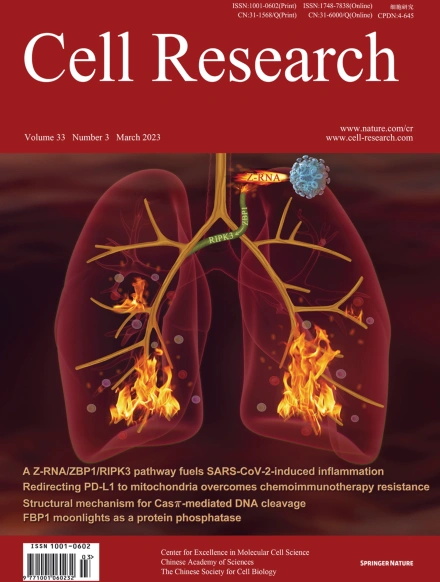
Advanced Search
Submit Manuscript
Advanced Search
Submit Manuscript
Volume 33, No 3, Mar 2023
ISSN: 1001-0602
EISSN: 1748-7838 2018
impact factor 17.848*
(Clarivate Analytics, 2019)
Volume 33 Issue 3, March 2023: 201-214
SARS-CoV-2 Z-RNA activates the ZBP1-RIPK3 pathway to promote virus-induced inflammatory responses
Shufen Li1,† , Yulan Zhang1,† , Zhenqiong Guan1,2,† , Meidi Ye1,2 , Huiling Li1,2 , Miaomiao You1,2 , Zhenxing Zhou3 , Chongtao Zhang1 , Fan Zhang1 , Ben Lu4,* , Peng Zhou5,* , Ke Peng1,2,6,*
1State Key Laboratory of Virology, Center for Antiviral Research, Wuhan Institute of Virology, Chinese Academy of Sciences, Wuhan, Hubei, ChinaSARS-CoV-2 infection can trigger strong inflammatory responses and cause severe lung damage in COVID-19 patients with critical illness. However, the molecular mechanisms by which the infection induces excessive inflammatory responses are not fully understood. Here, we report that SARS-CoV-2 infection results in the formation of viral Z-RNA in the cytoplasm of infected cells and thereby activates the ZBP1-RIPK3 pathway. Pharmacological inhibition of RIPK3 by GSK872 or genetic deletion of MLKL reduced SARS-CoV-2-induced IL-1β release. ZBP1 or RIPK3 deficiency leads to reduced production of both inflammatory cytokines and chemokines during SARS-CoV-2 infection both in vitro and in vivo. Furthermore, deletion of ZBP1 or RIPK3 alleviated SARS-CoV-2 infection-induced immune cell infiltration and lung damage in infected mouse models. These results suggest that the ZBP1-RIPK3 pathway plays a critical role in SARS-CoV-2-induced inflammatory responses and lung damage. Our study provides novel insights into how SARS-CoV-2 infection triggers inflammatory responses and lung pathology, and implicates the therapeutic potential of targeting ZBP1-RIPK3 axis in treating COVID-19.
https://doi.org/10.1038/s41422-022-00775-y